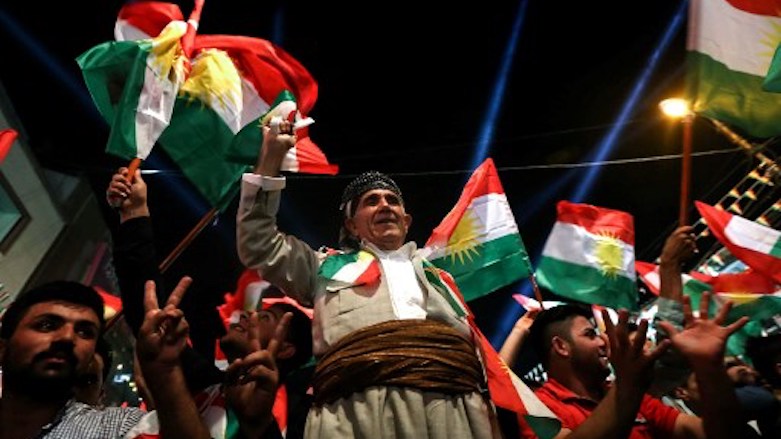Yet another US official hails Kurdish ‘miracle’

WASHINGTON DC (Kurdistan 24) – When US Secretary of Energy, Dan Brouillette, met the Kurdistan Regional Government (KRG) Prime Minister, Masrour Barzani, he had the highest praise for the achievements of Iraq’s Kurds.
Speaking at the Munich Security Conference to Kurdish reporters last Friday, before meeting with Barzani, Brouillette said, “I think today, we’re going to celebrate a miracle: your miracle.”
Brouilette went on to explain that although “the Kurds are a land-locked people, in the middle of a continent,” today “they export more oil than Libya,” as he proceeded to praise Barzani’s “good work, your leadership.”
“I look forward to our conversation, and we want to help you expand even further,” the US Secretary of Energy affirmed.
Barzani echoed Brouilette’s remarks, explaining that before this meeting, he had been in contact with the Secretary, and “we hope that we can increase our cooperation in the energy sector with the US.”
The Kurdish “Miracle”
In Munich, Brouilette became the most recent of senior US officials to publicly hail the Kurdish miracle.
Sen. Tammy Duckworth
US Senator Tammy Duckworth (D, Illinois) fought in the US Army as a helicopter pilot during Operation Iraqi Freedom (OIF). In 2004, her helicopter was shot down near Taji. She was badly wounded, losing both her legs.
But 15 years later, in 2019, Duckworth returned to Iraq, including to the Kurdistan Region, as head of a Congressional fact-finding mission. She then spoke about her trip to the Center for Strategic and International Studies in Washington DC.
Read More: Sen. Duckworth: Kurdistan is model for Iraq; ISIS not defeated
She, too, described the Kurdish miracle. “When I used to go up to the Kurdish Region, there was one fancy hotel on top of a hill and that was it,” she explained, describing Erbil in the early days of OIF.
“We landed on a hillside and parked our helicopters and walked up to the one hotel.” Now, there are “high-rises, it’s gleaming, it’s modern”—in sum, “an international cosmopolitan city,” the Senator said.
Lt. Gen. Jay Garner
Lt. Gen. Jay Garner (US Army, Retired) headed the humanitarian effort that followed the first Gulf War – Operation Provide Comfort – which brought the Kurds home from the mountains to where they had fled, fearing Saddam Hussein’s revenge after the ceasefire to the 1991 war. Twelve years later, in 2003, Garner headed the US reconstruction effort in Iraq in the earliest days of OIF.
Garner took the Kurdish miracle back to the early 1990s. He stated that when he left the Kurdistan Region in the fall of 1991, crossing the Habur bridge into Turkey, he felt very sad.
They “don’t have a chance,” Garner said to his colleagues, of the people he was leaving. Twenty-five years later, in 2016, he explained to Kurdistan 24 why he had felt that way.
“5,000 villages had been destroyed” in Saddam’s genocidal Anfal campaign, Garner stated. “A good, large portion of Erbil had been destroyed,” along with other Kurdish cities, and “there was no economy.”
“On top of that, we didn’t give [the Kurds] any assistance after that,” as the US had intervened only to address the immediate humanitarian crisis.
“I don’t think you can find a case in history,” Garner affirmed, “where a group of people have gone from that devastation to where they are now, in 20, 25 years.” It’s “an amazing story, an incredible story.”
Garner also explained that when he returned in 2003, he “did not recognize” the Kurdistan Region, from when he had left it in 1991. And “if you come back now [i.e. 2016], you don’t recognize it from 2003. It’s so far advanced from then.”
“Kurdish Iraq is the Iraq we wanted to have,” Garner later affirmed to Kurdistan 24. “Kurdistan is what we wanted Iraq to be.”
Lt. Gen. H. R. McMaster
Speaking as National Security Advisor in late 2017, H.R. McMaster told an audience at Washington’s Jamestown Foundation that the development of the Kurdistan Region after 1991 “was a miracle, almost,” in terms “of the growth of beautiful cities in Sulaimani, Erbil, and Duhok.”
“The return of populations to those regions, a vibrant, but fragile economy, vulnerable economy,” he stated, before concluding “and so what we want is the success of Iraq. We want an Iraq that is strong.”
Secretary Brouillette’s pledge of support will help further strengthen the economy of the Kurdistan Region. However, McMaster’s conclusion is the kind of official US statement that makes Kurds, and their friends, wince.
Why subordinate the Kurdish success story to the floundering, corrupt, and ineffectual regime in Baghdad?
As Garner stated, “The only working part of Iraq is here—in the KRG. The rest of it doesn’t work.”
Editing by Karzan Sulaivany
